China battery thermal management system manufacturer. Cooling capacity range 3-10kw.
1. Application: for E-bus/ truck/ heavy equipment/ boat, etc.
2. World Top 500 BYD / TATA Supplier
3. 10 Years of Experience in R&D and Design
4. Certifications: ISO 9001, IATF 16949, etc.
5. Customized: Dimension/ Cooling/ Heating, etc.
The optimal operating temperature of the EV battery is 20° to 45°. If this temperature is exceeded, the driving range and the life of the battery will drop dramatically. What’s more, it may also affect the surrounding equipment and cause the consequences of combustion and explosion. If the battery is below this temperature, its electrochemical reaction activity will become poor and the performance of the battery will be greatly reduced.
Battery thermal management system is a system specially designed to cool down power batteries. It is an indispensable component of commercial electric vehicles. TKT battery cooling system adopts liquid cooling and PTC for heating, which can steadily take away a large amount of heat generated by the battery. This is the most commonly used battery cooling method for electric buses, electric trucks, electric heavy equipment, and electric boats.
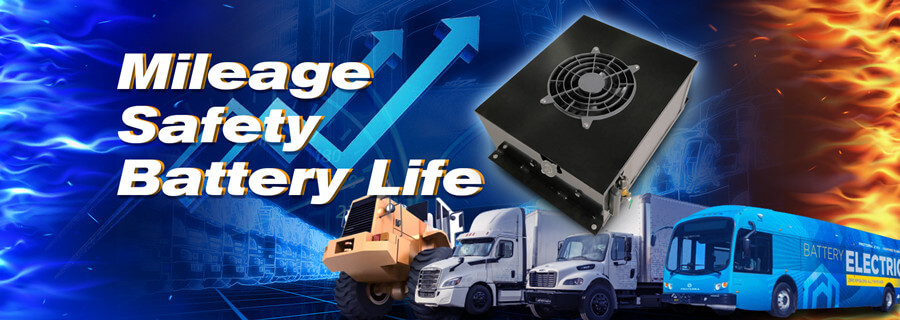
Click to learn more about the principle
TKT battery thermal management system has a wide range of solutions. The cooling capacity is from 3-10kw and the mounting positions are top mounted and side mounted. There is also the latest BTMS integrated system for bus air conditioning, which is an integrated solution for electric buses. TKT also supports OEM customization service. We can solve 99% of different customers’ needs.
▲More than 10 years of market proof, over 200,000 units in operation worldwide, with quality and performance widely recognized worldwide.
▲Patent Design to make higher cooling/heating with less weight;
▲Bigger Coolant flow to maintain battery temperature in shortest temperature;
▲CAN Control to avoid the wrong operation to damage battery pack (Runs automatically to keep battery temperature stable);
▲Adopt IP67 electric parts, such as electric compressor, water pump, connectors ect;
▲Fast OEM/Customized Design (1 month);
▲Precise Temperature Control (0.5 Deg.C);
Over the past 10 years, TKT HVAC has developed rapidly and has become the top 3 battery thermal management system manufacturers in China. With rich OEM experience, we have cooperated with many world-famous vehicle manufacturers. Such as BYD, TATA motos, Switch mobility, Daewoo, etc. The cooperative projects include a variety of electric bus battery thermal management system, light truck battery thermal management system, heavy truck battery thermal management system, etc.
“EV Battery Thermal Management Case Study – A Customized Story for Fortune 500” Click to read (highly recommended)
Real vehicle test, stable operation (Click on image to enlarge)

Welcome to contact us for professional model advice. In addition, TKT provides OEM customization services, and vehicle manufacturers are welcome to consult.
| Support Customized Services |
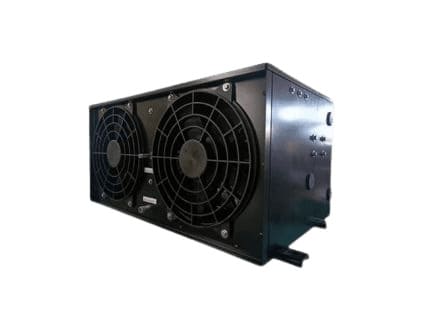 |
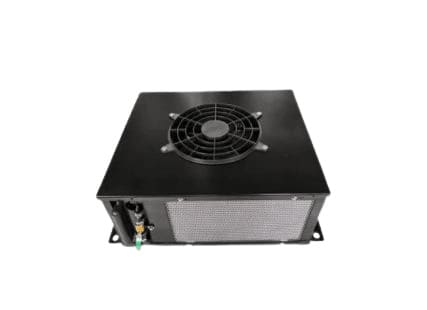 |
| Capacity | Cooling: 8-10KW Heating: 6-10KW (Optional) |
Cooling: 5-6KW Heating: 3KW (Optional) |
| Application | 11-12M Electric Bus BTMS (DC240V-DC750V) |
8-10M Electric Bus BTMS (DC240V-DC750V) |
| Product Model |
10R/10CW for EBus View Page 10R/10CW |
5R/5CW for EBus View Page 5R/5CW |
| Support Customized Services |
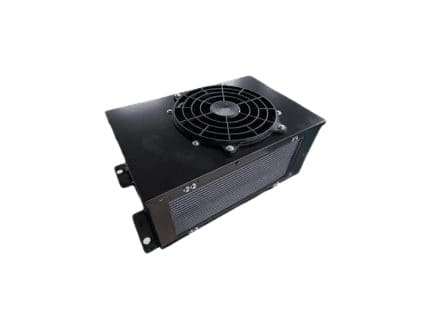 |
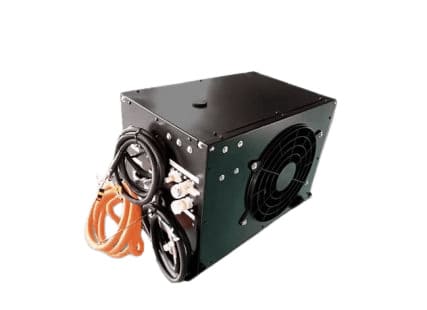 |
| Capacity | Cooling: 3-4KW Heating: 1-2KW (Optional) |
Cooling: 5-6KW Heating: 3KW (Optional) |
| Application | 6-7M Electric Bus BTMS (DC240V-DC750V) |
Electric Truck BTMS (DC240V-DC750V) |
| Product Model |
3R/3CW for EBus View Page 3R/3CW |
5CW for ETruck View Page 5CW |
| Support Customized Services |
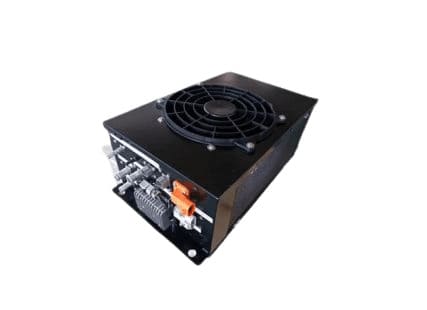 |
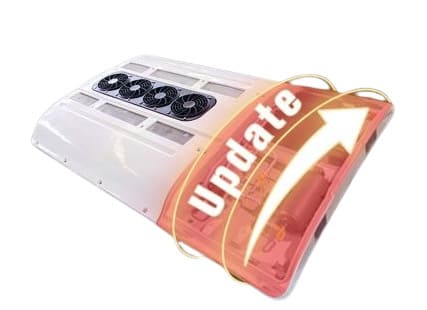 |
| Capacity | Cooling: 3-4KW Heating: 1-2KW (Optional) |
BTMS Cooling: 8KW Bus A/C Cooling: 143K BTU |
| Application | E-Heavy Equipment BTMS (DC240V-DC750V) |
E-Bus A/C + BTMS (DC240V-DC750V) |
| Product Model |
3R for EHE View Page 3R |
View Page Integrated System |
Contact us for High Resolution Images


1. Battery type and specifications: Different battery application scenarios have different requirements for battery thermal management system. For example, if it is a power battery and applied to an electric bus, its battery voltage is usually between 280v-750v. When an electric bus is running, the battery produces a lot of heat, which requires a battery liquid cooling system.
2. EV Reserve space: When different vehicle manufacturers design new vehicles, the design space of each part is planned. For example, because electric trucks have boxes, we usually recommend designing the truck battery thermal management system (BTMS) on the outside of the truck and adopting a side-mounted installation solution. The advantage of this is that it is conducive to the release of heat dissipation performance and the battery cooling efficiency is high. Of course, we also have other truck battery cooling solutions that can solve 95% of truck battery cooling needs. For another example, the overall space of electric heavy machinery is small, so there are strict requirements on the size of the battery thermal management system. We have split battery cooling solutions and also provide customized services, so we can perfectly solve the needs of battery thermal management system of different sizes.
3. Quality and reliability: The battery thermal management system (BTMS) is very important for electric vehicles. It can not only ensure vehicle safety but also reduce vehicle operating costs. A high-quality cooling system can greatly improve battery life and vehicle range, thereby reducing battery replacement costs and vehicle charging costs. Therefore it is very important to choose a good battery thermal management system. TKT BTMS products have been supplied to Fortune 500 companies, passed their strict inspections, and have been in actual vehicle operation for more than 5 years. Only practice can tell whether a product is good or not. Five years of stable operation is the best proof. TKT has rich experience in cooperation with OEM vehicle manufacturers, such as BYD project, TATA motors project, Switch mobility project, etc.
Condenser coil, condenser fan, water tank, water pump, heat exchanger, electric compressor, control panel, CAN module, expansion valve, etc.
The condenser system cools down the coolant and the water pump will run the coolant through the BTMS and the battery structure system to release the heat generated by the battery pack.
Battery thermal management system is mainly divided into battery air cooling, battery liquid cooling, phase change material cooling, and battery immersion cooling. Different cooling methods need to be selected based on scenario judgment. For commercial electric vehicles, because the battery capacity of electric vehicles is relatively large, they are all high-voltage power batteries, so they release a lot of heat. Now the most cost-effective and stable program is battery liquid cooling.
The function of the battery thermal management system is to adjust the temperature of the battery in real time and maintain the battery operating within the optimal temperature range to ensure battery performance, life and safety. Mainly speaking, it is divided into the following situations.
1. Prevent overheating: When the battery temperature is too high, the battery performance will be affected and may even malfunction. The battery thermal management system can reduce the battery temperature in time through heat dissipation and other methods to prevent the battery from overheating.
2. Prevent overcooling: In low-temperature environments, battery performance will also be affected and may even fail to work properly. The battery thermal management system can promptly increase the battery temperature through heating and other methods to prevent the battery from overcooling.
3. Maintain battery temperature stability: During vehicle driving, the battery temperature will continue to change. If the temperature fluctuation is too large, it will have a negative impact on battery performance. The battery thermal management system can keep the battery temperature stable by controlling coolant flow and other methods.
4. Improve battery life: By controlling the battery temperature within the optimal range, the battery life can be extended. Reduce the number of replacements and reduce maintenance costs.
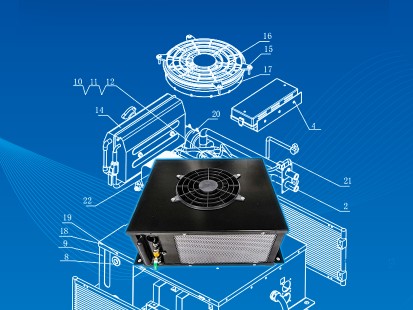
Battery cooling technology is more demanding for the design of electric buses and electric trucks, which TKT has been working on since 2012.
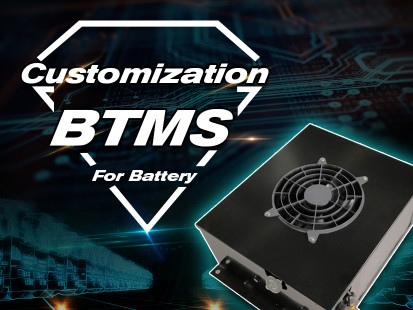
The most effective solution to improve driving range without increasing the number of batteries is a custom battery thermal management system.
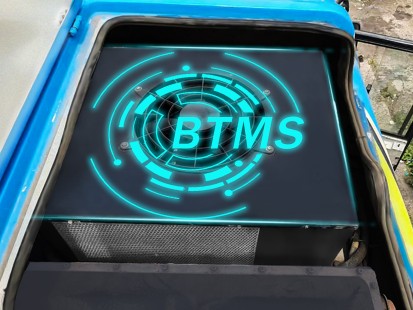
EV Battery Thermal Management Case – Customized for Fortune 500. TKT’s BTMS has 10 years of design experience.